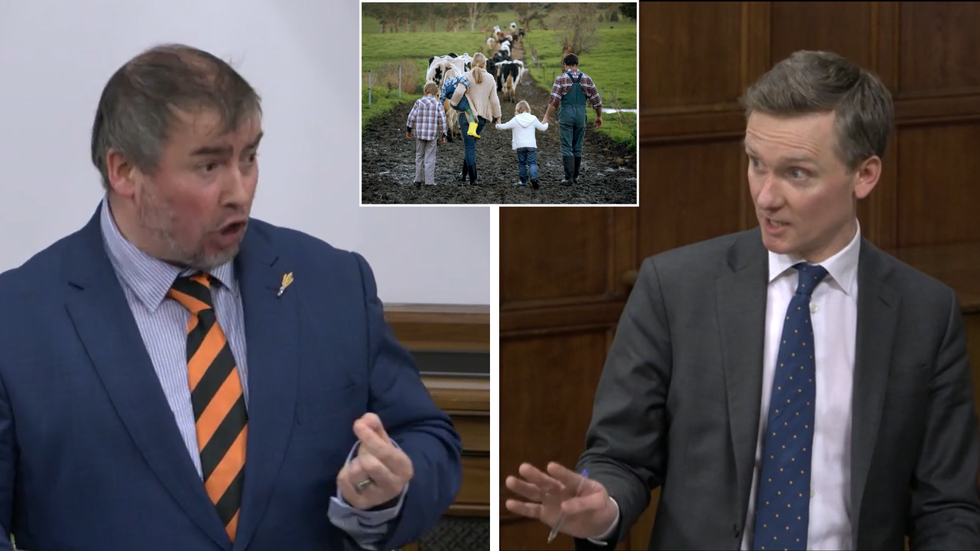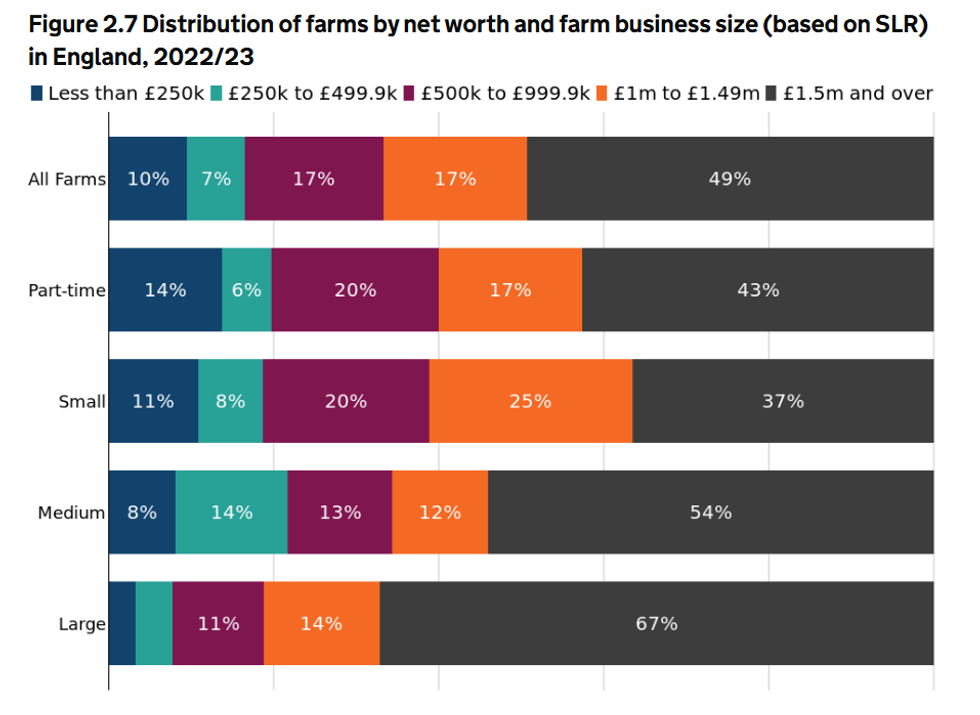Labour treasury minister defends farm IHT amid fierce questioning
GBN
Torsten Bell interrupted nine times during defence of farm tax as chair calls for ‘order’ repeatedly
Don't Miss
Most Read
Trending on GB News
A Labour Treasury Minister has sparked fury by claiming his party’s imposing of death duties on farmers is ‘actually very generous.’
Torsten Bell, Parliamentary Secretary for the Treasury, was defending Chancellor Reeves’ tax raid in a fiery Westminster Hall debate that saw him interrupted nine times when he made the claim.
Bell’s boss Chancellor Reeves slapped previously exempt farmers with 20 per cent death tax on assets over £1million in her October budget.
It caused outrage amongst cash-poor but asset-rich farmers who say their profits will be wiped out for decades, if indeed they did make a profit.
A shocking 17 per cent of farms did not make a profit in 2022, Defra statistics show.
Several lobby groups, tax experts and rural stakeholders have warned the Treasury the move risks breaking the backbone of British agriculture as farmers will simply sell up in the face of such crippling tax bills.
London-born Bell, who was parachuted into the safe Labour seat of Swansea West at the last election, defended the raid as a fair and balanced to way fill the £22billion black hole, citing heavily contested Treasury figures of how many farms will be affected.
“We will continue to provide significant tax relief, including for small farms and businesses,” added Bell.
“Individuals will still benefit from 100 per cent relief for the first £1million of combined business and agricultural assets.
“And importantly, the relief sits on top of all the other spousal exemption and nil rate bands.
“Depending on people's circumstances, up to 3 million can be passed on by a couple to their children or grandchildren free of inheritance tax.... Tax reliefs remain very generous indeed.”

Earlier in the debate, Labour MP Steve Witherden (left) broke ranks and attacked Labour's farm tax plans that were later defended by Treasury minister Torsten Bell (right)
HoC/Getty
While farmers do benefit from £1million tax relief, experts have pointed out that growing food or raising animals in the UK is an extremely expensive business.
Land in the UK averages £10,000 an acre, meaning a mere 100-acre farm (almost certainly not commercially viable) would trigger inheritance tax.
That doesn't take into account machinery like combine harvesters (up to £750,000) farmhouses, farm buildings (many of which have development potential) or diversified parts of farm business like farm shops or Air BnBs.
Farmers have also highlighted that these assets do not translate into wealth unless they are liquidated.
For thousands of families across Britain farming is a way of life and ownership of valuable farms is merely seen as custodianship for the next generation.
Bell, who holds a PPE degree from Oxford, also highlighted how farmers would pay 20 per cent rate of tax ‘rather than the standard 40 per cent.’
He has previously tweeted about his distaste for farmers’ tax relief using this comparison with the standard rate of inheritance tax.
Bell cited an example of parents leaving a £3m house to their children, for which the inheritance tax bill would be £940k, and parents leaving a £3m farm to their children, for which the bill would be £0.
The example was widely ridiculed for the obvious difference between owning a luxury house that contributes little to society and owning a farm that grows the food and raises animals to keep the nation fed.
Farmers also pointed out that owning and running a farm regularly requires 60 to 70 hour working weeks, mostly spent outside and alone in all weather conditions.
According to the Welsh government’s latest statistics, farms in Bell’s adopted country of Wales earned £30,000 on average last year, leaving little to no scope to pay inheritance tax.
This is £83,000 less per year than what Bell makes from his salary as an MP and Parliamentary Under-Secretary of State.
Bell added: “Farms can also spread the payments over ten years interest free, a benefit that is not seen anywhere else in the inheritance tax system.”
At this point, Liberal Democrat MP Alistair Carmichael interjected: “I mean, if you're earning £25,000 a year and you're looking at a £400,000 tax bill, which is what you would be paying for a £3 million farm, you're still going to struggle to make that payment in the ten years. In fact, it would be downright impossible. That's how the land gets sold.”
Observer columnist Bell replied: “I'm not going to comment on the individual example he's giving, but generally he's right to say... [laughter around the room]
“In general, he's right to say that there can be large variation in the profits of farms between years and between farms.
“That's partly why the tax system, already uniquely for farmers, allows us to average profits over periods of time. But all farmers who think they'll be affected with this, obviously our advice is that they should seek advice in turn.” [more laughter].
 Defra's stats show 66% of English farms are over the new £1million inheritance tax relief cap, undermining the Treasury's claim '75 per cent of farms won't be affected'GOV.UK
Defra's stats show 66% of English farms are over the new £1million inheritance tax relief cap, undermining the Treasury's claim '75 per cent of farms won't be affected'GOV.UKReacting to the debate, Liz Webster, founder of Save British Farming, said: “Back to school! Mr Bell clearly needs to go back to university and study history and geography.
“History shows us that reliance on imports after the repeal of the Corn Laws in 1846 led to Britain nearly starving in two world wars prompting the ‘Dig for Britain’ effort and food rationing.
“It was indeed a Labour govt after the war which recognised the absolute need to subsidise farming to bolster self-sufficiency and protect our food security.”
It comes after another major tractor protest has been confirmed that is set to bring Westminster to a standstill for third time.
The ‘Change your tune Starmer’ tractor rally will gridlock central London on February 10, according to organisers Save British Farming.
"Successive governments have failed to internalise the lessons learnt from the last two world wars when reliance on imports left Britain exposed, ensuring the ‘Dig for Britain’ effort and food rationing,” said a spokesperson for the group.
“History does repeat itself and this Government assumes that cheap imports from volatile regions will always be available.
“We do not have an Empire any more to redirect food supplies to Britain and urgently need Government to think again as global tensions are increasing.
“Failure to heed the lessons of the past is ensuring we are marching into a food crisis and being held to ransom by hostile nations.”
Jeff Gibson, Founder of Kent Fairness For Farmers, said: “When British agriculture should be preparing for the future and building up our food security, our Government is doing everything it can within its power to destroy British farming which has kept us fed and healthy since the last war.
“We need Government to come to the table and listen to farmers to ensure this country has an adequate food plan and food security. Food security is national security.”
LATEST FROM MEMBERSHIP:

Liz Webster has called on Defra Secretary Steve Reed to resign
GB NEWSThe protest will apply increasing pressure to Reeves and Defra Secretary Steve Reed who are refusing to budge on the tax.
Commentators have underlined how the pair may have significantly underestimated resistance to their tax hike and are burning significant amounts of goodwill amongst rural folk for a mere £520million a year by 2030.
That’s enough to fund the NHS for little over one day and is 50 times smaller than Reeves’ National Insurance hike, yet it has drawn ire from around Britain.
Economists have also told the Treasury their death duties plan will end up costing the Treasury more than it raises in lowered tax receipts.
They point to a looming recession in Britain’s agricultural sector as farmers scale back investment and look to cut costs in preparation for a hefty tax bill.
Industries close to agriculture like animal feed businesses, hauliers, livestock markets and fertiliser providers have all also reported empty order books as trade grinds to a halt.
A Treasury spokesperson said: “Our commitment to farmers remains steadfast.
“This Government will invest £5 billion into farming over the next two years, the largest budget for sustainable food production in our country’s history.
"We are going further with reforms to boost profits for farmers by backing British produce and reforming planning rules on farms to support food production.
“Our reform to Agricultural and Business Property Relief will mean estates will pay a reduced effective inheritance tax rate of 20%, rather than standard 40%, and payments can be spread over 10 years, interest-free.
"This is a fair and balanced approach, which fixes the public services we all rely on, affecting around 500 estates a year.”
Defra has been approached for comment.







